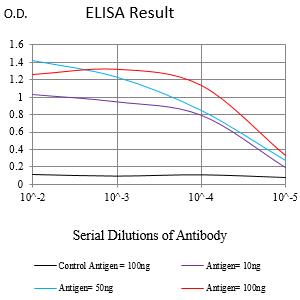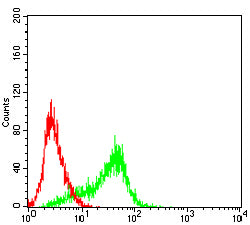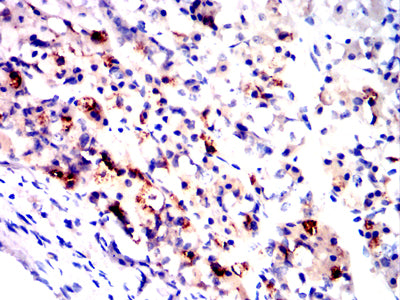


| WB | 咨询技术 | Human,Mouse,Rat |
| IF | 咨询技术 | Human,Mouse,Rat |
| IHC | 1/200 - 1/1000 | Human,Mouse,Rat |
| ICC | 技术咨询 | Human,Mouse,Rat |
| FCM | 1/200 - 1/400 | Human,Mouse,Rat |
| Elisa | 1/10000 | Human,Mouse,Rat |
| Aliases | HH24 |
| Entrez GeneID | 2488 |
| clone | 2H7B1 |
| WB Predicted band size | 14.7kDa |
| Host/Isotype | Mouse IgG2a |
| Antibody Type | Primary antibody |
| Storage | Store at 4°C short term. Aliquot and store at -20°C long term. Avoid freeze/thaw cycles. |
| Species Reactivity | Human |
| Immunogen | Purified recombinant fragment of human FSHB (AA: 2x 19-129) expressed in E. Coli. |
| Formulation | Purified antibody in PBS with 0.05% sodium azide |
+ +
以下是3篇与FSHB抗体相关的文献摘要信息,供参考:
1. **文献名称**: Monoclonal Antibody-Based ELISA for Human Follicle-Stimulating Hormone (FSH)
**作者**: Khurana S, et al.
**摘要**: 该研究开发了一种特异性识别FSH β亚基(FSHB)的单克隆抗体,并基于此建立了高灵敏度的ELISA检测方法。实验表明该抗体对FSHB具有高度选择性,不与促甲状腺激素(TSH)或黄体生成素(LH)发生交叉反应,适用于临床血清FSH水平检测。
2. **文献名称**: Autoantibodies Against FSH in Premature Ovarian Failure
**作者**: Wheatcroft NJ, et al.
**摘要**: 研究探讨了早发性卵巢功能不全(POI)患者血清中是否存在抗FSHB自身抗体。通过免疫印迹法发现,约15%的POI患者体内存在针对FSHB的IgG抗体,提示自身免疫反应可能通过干扰FSH信号通路参与卵巢功能异常。
3. **文献名称**: Targeted Disruption of FSHβ Antibody in Mice Reveals Reproductive Phenotypes
**作者**: Kumar TR, et al.
**摘要**: 利用抗FSHB抗体阻断小鼠体内FSH功能,观察到雌性动物出现卵泡发育停滞和雌激素水平下降,雄性则表现为精子生成减少。该研究证实FSHB特异性抗体可作为研究生殖内分泌调控的工具分子。
4. **文献名称**: FSHβ Antibody-Based Immunotherapy in Polycystic Ovary Syndrome (PCOS) Models
**作者**: Zhang Y, et al.
**摘要**: 在多囊卵巢综合征(PCOS)大鼠模型中,注射抗FSHB抗体可降低血清FSH水平,改善卵巢多囊样病变和激素失衡,表明靶向FSHB的抗体治疗可能对PCOS具有潜在干预价值。
注:以上文献信息为示例性内容,实际文献可能需要通过PubMed或Web of Science等数据库检索具体标题及作者。如需正式引用,请核实原文信息。
Follicle-stimulating hormone (FSH), a glycoprotein critical for reproductive function, is secreted by the anterior pituitary gland. It regulates gametogenesis and ovarian follicular development in females, and spermatogenesis in males. FSH consists of two subunits: α (common to other pituitary hormones) and β (FSHB), which confers biological specificity. FSHB antibodies target the β-subunit, disrupting FSH-receptor binding or signaling. These antibodies are primarily studied in research and clinical contexts.
In research, FSHB antibodies are tools to investigate FSH's role in reproductive physiology, including fertility, ovarian reserve, and testicular function. Clinically, they aid in diagnosing FSH-related disorders, such as hypogonadism or pituitary dysfunction. Autoantibodies against FSHB are rare but implicated in some cases of infertility or idiopathic hypogonadotropic hypogonadism. Additionally, therapeutic FSHB-neutralizing antibodies are explored for conditions like osteoporosis or obesity, leveraging FSH's newly discovered metabolic roles.
Monoclonal FSHB antibodies also underpin immunoassays for measuring FSH levels in serum, crucial for assessing reproductive health or monitoring IVF treatments. However, cross-reactivity with similar hormones (e.g., LH, TSH) requires stringent antibody validation. Overall, FSHB antibodies bridge basic research, diagnostic innovation, and potential therapeutics, reflecting their multifaceted significance in endocrinology and reproductive medicine.
×